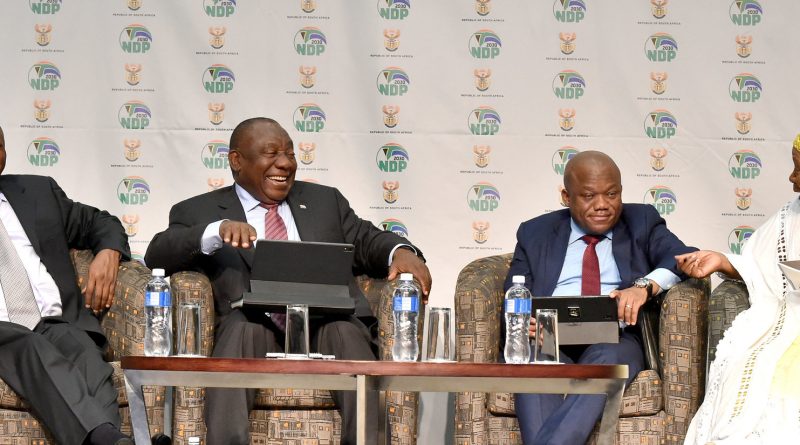NAVIGATING THE PATH OF LOCAL GOVERNMENT FOR THE MODERN SOCIETY
“The world is moving forward very rapidly, and just as production processes change and public sentiment changes, likewise the service processes of the public administration must also change.” – Domenico Casalino, CEO of CONSIP
Mr Mthokozisi Nzuza
Manager: Human Resources iLembe District Municipality
- Local Government in Context
The advent of democracy in South Africa brought to the society a hope for a peaceful and prosperous country. The adoption of the progressive policies such as the Constitution, various radical and liberal laws, regulations, and strategic plans, has continuously reinforced the hope to the citizenry and electorate. The Constitution in particular provides significant rights that gives a guarantee of, “a society based on democratic values, social justice, … improve the quality of life of all citizens and free the potential of each person”.
The Constitutional fundamentals are exactly the context within which both the political and administrative leadership of Local Government find themselves, and have to comply and deliver to the present society and lay the foundation for the future generations. The commitment and expectation for Local Government is specifically prescribed in Chapters 7 of the Constitution, particularly Section 152 which states clearly the objects of Local Government, and Section 153 which prescribes the developmental duties for Municipalities.
Further to the Constitution, Local Government has its tasks clearly specified through various legislation which is very prescriptive. The various legislative framework is derived from what can be termed as the mini-constitution of the sphere of Local Government, i.e. the White Paper in Local Government. It is the White Paper in Local Government that precisely defines a developmental local government which is prescribed by S153 of the Constitution, and clearly specifies the characteristics of the said developmental local government, i.e.
Developmental local government is local government committed to working with citizens and groups within the community to find sustainable ways to meet their social, economic and material needs and improve the quality of their lives.
Characteristics of developmental local government
- Maximising social development and economic growth
- Integrating and coordinating
- Democratising development, empowering and redistributing
- Leading and learning
The definition and the characteristics prescribed by the White Paper clearly provide the thesis and genesis for a Local Government being rooted in the society being served. The various legislative framework of Local Government prescribes the what, how, and when parts of all that is prescribed by the definition and characteristics. The questions that needs to be answered are, who the society that Local Government must serve is, and is Local Government modelled accordingly to serve effectively and efficiently.
- Whither modern is society
The statement of the then Deputy of the Republic of South Africa (Mr T. Mbeki), made in Parliament on the 29 May 1998, stated the following:
“A major component part of the issue of reconciliation and nation building is defined by and derives from the material conditions in our society which have divided our country into two nations, the one black and the other white. We therefore make bold to say that South Africa is a country of two nations”.
The statement of 10 October 2019 from the World Bank, stated the following regarding South Africa:
“South Africa remains a dual economy with one of the highest inequality rates in the world, with a consumption expenditure Gini coefficient of 0.63 in 2015. Inequality has been persistent, having increased from 0.61 in 1996. High inequality is perpetuated by a legacy of exclusion and the nature of economic growth, which is not pro-poor and does not generate sufficient jobs. Inequality in wealth is even higher: the richest 10% of the population held around 71% of net wealth in 2015, while the bottom 60% held 7% of the net wealth. Furthermore, intergenerational mobility is low meaning inequalities are passed down from generation to generation with little change in inequality over time. Not only does South Africa lag its peers on level of inequality and poverty, it lags on the inclusiveness of consumption growth”.
Notwithstanding the great strides made thus far to achieve a society envisioned by the Constitution of this country, there remains significant disparities in the society served by the Local Government. Certainly as the statement by the former President Mbeki declares, the apartheid historical factors remain and have a significant emblem. To deny this due to 26 six years of democratic dispensation and any “own-goals” challenges, is not just cynical but contempt of the historical humiliation and degradation.
Concurrent to the historical factors is the current triple challenge of poverty, inequality, and unemployment. This has perpetuated the divide in society into class than racial. There is certainly a segment of society that lives in affluent areas, the other in modest areas, the other in lower but better areas (townships), the other in rural areas, and the other in squalor areas. Such is the nature and character of the society that must be served by Local Government, regardless of the capacity of the Municipality. The class divide of society is persistent across all the ‘wall-to-wall” Municipalities of this country.
- Modelling Local Government towards radical service delivery
“Amid a tumultuous global political and economic landscape, governments across the world know one thing for certain: seismic economic and demographic shifts are reshaping public services. We believe that governments now have the opportunity to make significant shifts of their own. Caught in an unsustainable position between the desire to deliver better public services outcomes and the unaffordability and often, the ineffectiveness of doing so using today’s ways of working, forward-looking government leaders will: shift their thinking about what really matters to deliver for citizens and businesses; shift their approaches for delivery; and, crucially, shift the balance between what they can accomplish in public services and the costs of doing so by increasing public service productivity.
It’s time to think radically, deploying a new generation of processes and tools to build the public services of the future and using those we already have in new and better ways. However, this simple concept of shifting represents a quandary in practice, because of the radical nature of the change it implies.
A positive future for public services will only come from public services turning old ideas and ways of working on their head making structural shifts in how they shape and deliver outcomes, both through wholly new service models and in massive reductions to their cost bases”. Accenture (2012)
The above statement by Accenture seem to be in line with the question asked by one the revolutionaries of all times, Vladimir Ilyich Ulyanov better known by his alias Lenin, a Russian revolutionary, politician, and political theorist, who served as head of government of Soviet Russia. He once asked the question, what is to be done?
Local Government is fraught by well-known systematic challenges which have been constantly reported and stated, i.e. governance, accountability, capacity and skills shortage, financial constraints, and service delivery constraints. These are exacerbated by issues of corruption, environmental, community unrests, and labour expectations and demands. Further to these challenges is the problem of disjointed actions by the various spheres of Government. Many a time there exist a situation where the plans and activities of the National and Provincial Governments are not incorporated in the IDP of the Municipality.
The challenges creates a situation of a gap between what the Municipalities do as service delivery to the society, and the expectations of the society. Included therein are also expectations of the workforce who are ‘double’ beneficiaries of the Municipality as workers and members of the society. The disjointed approach by all spheres of Government creates a confusion to the society who then resolve to take protest actions directly to where they can reach easily, the Municipality.
Certainly, there are efforts to try and remedy the situation. However, the inconsistency in the policy framework for assisting Municipalities also contribute to the challenges. The 2009 Local Government Turnaround Strategy was in 2016 substituted with Back-to-Basics, which itself it is now to be substituted with the District Development Model. This however, does not exonerate Municipalities from their respective Constitutional obligation to deliver to their own constituencies. Section 151 (2) and (3) of the Constitution are very clear in that:
(2) The executive and legislative authority of a municipality is vested in its Municipal Council.
(3) A municipality has a right to govern, on its own initiative, the local government affairs of its own community, …”

- What is to be done
Literature on modernity is only unanimous in stating that it is often characterized by comparing modern societies to pre-modern or post-modern ones. However, it is clear that the possibility of a precise descriptive concept that can adequately capture the diverse realities of societies, is not concrete. The summary of the characteristics of a modern society, which of course is not limited, include democracy, universalism, secularism, technology, individualism, urbanization, mass literacy, and proliferation of mass media.
Municipalities have to deliver services to the community that that is part of the modern society which consist of the characteristics listed above, and possibly more. Accenture states that their research consistently discovered that, “citizens call for public services that promote a flourishing society, safety and security, and economic vitality”. This view is supported by the statement contained in the PricewaterhouseCoopers (PwC) document titled: Cities of the Future. The statement states that Municipalities, “… need to respond to the demands of many different groups and manage the allocation of resources between different, and often competing, claims”.
Browsing and reading through all available information, as well as discussing with various stakeholders such as ordinary members of society, intellectuals, and Municipal experts and workers, it is clear that the diagnosis and remedy exist. What is required is both the political and administrative will to:
- comply with the existing legislative framework,
- ensure genuine citizen involvement,
- have an outcome based governance,
- occupy Municipal positions with individuals that will ensure an excellent operational administration,
- discard silos and have a genuine integrated approach that act with determination to achieve the Constitutional undertaking to the society.
- Conclusion
There is no dispute that Local Government is the sphere that is closest to the society. It is therefore the immediate sphere of Government at which the citizenry expects to see and realise the undertaking enshrined in the Constitution of the country, i.e. to create development opportunities for all South Africans, irrespective of colour, race, class, belief or sex; and to improve the quality of life of all citizens.
The society and those leading the sphere of Local government are aware about the existence of the legal framework that has to be complied with in order to fulfil the mandate noble ideals of the peaceful and prosperous society. The challenges facing the sphere of Local Government are equally known and compounded by the disjointed implementation approach.
The characteristics of the modern society though not definite, require that Local Government should be proactive, visionary, inclusive, efficient, and decisive. The fragmented approach by the spheres of Government should be rectified through the alignment of plans and a consolidated holistic response to the needs of the society.
- REFERENCES
Accenture. (2012). Delivering Public Service for the Future: Navigating the Shifts.
Department of Provincial Affairs and Constitutional Development. (1998). White Paper on Local Government. Pretoria.
Gay, Craig M. (1998). The Way of the (Modern) World: Or, Why It’s Tempting to Live As If God Doesn’t Exist. Grand Rapids: Eerdmans.
PricewaterhouseCoopers. (2005). Cities of the future: Global Competition, Local leadership. PricewaterhouseCoopers International Limited,
Republic of South Africa. (1996). The Constitution. (Act No 108 of 1996).
The Presidency. (29 May 1998). Statement of Deputy President Thabo Mbeki at the Opening of the Debate in the National Assembly, on “Reconciliation and Nation Building”. National Assembly Cape Town.
The Presidency. (2014). Background Paper: Local Government. Pretoria.
The World Bank. (2019). The World Bank’s strategy in South Africa reflects the country’s development priorities and its unique leadership position at sub-regional and continental levels.




